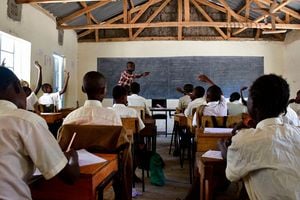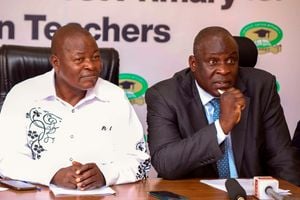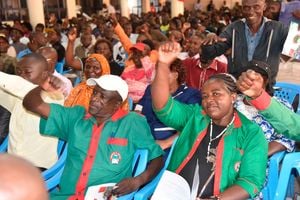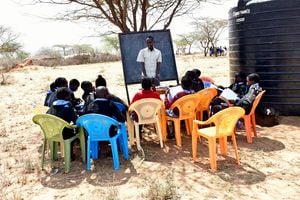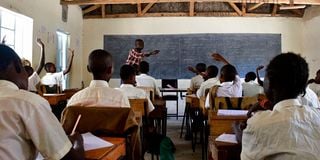
Grade Seven students at Ilmarba Junior Secondary School during a lesson in September last year.
The problems that plagued junior schools last year are far from over, as the newest segment in the education system entered the second year this week.
Schools are grappling with understaffing challenges as well as delivery of the curriculum even as progression to senior secondary school draws closer, with learners in public schools likely to suffer the most.
This is compounded by alleged rivalry between junior school and primary school teachers.
Parents who spoke to the Nation also told of lack of information regarding the textbooks appropriate for their children following the rationalisation of the curriculum content last year that saw the subjects reduced from 14 to 9.
Junior school was created as a transitional section between primary and senior secondary school under the competency-based curriculum (CBC) and comprises three grades. Currently, it has learners in Grades 7 and 8 and will be complete next year when the pioneer class joins Grade 9.
However, its roll-out last year was far from smooth. When the learners reported to school for First Term, there were no textbooks and teachers.
With a shortfall of 42,117 teachers, staffing continues to be a major challenge that might affect the delivery of the curriculum and achievement of the objectives of junior school.
“The additional one class in 2024 (Grade 8) in the junior school has created a staffing shortage of 42,117 at this level. Ideally, the number of teachers required this year in junior school is 99,045 against the current number of 56,928,” said Ms Nancy Macharia, the CEO of the Teachers Service Commission.
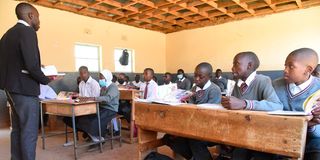
Teacher, Alfred Rotich, takes Junior Secondary School students at Kapsoya Primary School in Eldoret town, Uasin Gishu County, a public school, through an English lesson on February 13, 2023.
A survey by the Nation last year showed that teachers in junior schools are overworked as they are forced to teach subjects they have not trained for. Secondary school teachers specialise in only two teaching subjects at university.
To make matters worse, most of the teachers had been hired on one-year contract as ‘interns’. The TSC has extended the contracts for one more year, with a promise that the teachers will be absorbed on permanent and pensionable terms next year.
However, some of the teachers have protested the plan and have threatened to down their tools to force the government to employ them on permanent terms. At least one case has been filed in court seeking to have the government compelled to employ the teachers.
“We are a crossroads. We have a weak foundation (junior school) to prepare the learners for choosing their career pathways in senior secondary. To improve infrastructure and staffing, Parliament needs to appropriate more funds for junior school. We can’t use interns to implement a curriculum transition. They need to be employed on permanent terms,” Akello Misori, the secretary-general of the Kenya Union of Post Primary Education Teachers told the Nation.
“This year, our pioneer cohort of the CBC will be transitioning to Grade 8 in junior school. Although we are all so excited at this milestone, we are also aware that the cohort will be transitioning to Grade 9 in 2025 and would be expected to pose a massive strain to existing infrastructure. To pre-empt this crisis, the government is set to spend Sh12.8 billion to facilitate the construction of classrooms in junior schools in conjunction with Members of Parliament. Through these funds, we expect to have 15,015 classrooms ready for use in junior schools for Grade 9 next year,” said Education Cabinet Secretary Ezekiel Machogu.
The CS has also instructed the Kenya Institute of Curriculum Development (KICD) to fast track the rationalisation of learning areas as recommended by the Presidential Working Party on Education Reforms.
Also Read: The evolution of Kenya’s education system
Last month, Basic Education Principal Secretary Belio Kipsang issued a circular on the rationalisation that has also reduced the number of subjects in primary and junior school. The workload has also been shed off from 45 to 40 lessons per week.
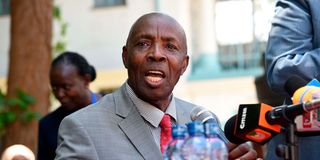
Education Cabinet Secretary Ezekiel Machogu at Nairobi Primary School on January 30, 2023, during the reporting of Junior Secondary School learners at the school.
Health education has been combined with integrated science. Also combined are pre-technical and business studies. Like in upper primary, agriculture and home science have again been integrated.
Sports and physical education, visual arts and performing arts will now be taught as creative arts and sports.
There will be no optional subjects in junior school. Previously, the optional subjects were visual arts, performing arts, home science, computer science, foreign languages (German, French, Mandarin or Arabic), Kenya Sign Language and indigenous languages.
This has now created confusion as many parents are in the dark over the books to buy since there are no books in the market with the rationalised content.
Also Read: The making of powerful headteachers
“In the meantime, I urge teachers to continue using the existing already approved textbooks since they have relevant content, tasks and assessments for learners as guided by the curriculum designs. I have directed the KICD to ensure the curriculum designs are uploaded on the KICD website by end of the week,” said Mr Machogu said on Monday during the release of the 2023 KCSE exam results.
Some teachers who have been hired as interns told the Nation of tensions between them and their primary school counterparts. Junior school is domiciled in primary schools. The rivalry is said to stem from the fact that the primary school teachers are employed on permanent terms and earn more than the Sh20,000 monthly ‘stipend’ the teacher interns receive.
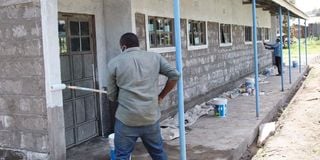
Workers paint a block of JSS classrooms at Elburgon Secondary School in Nakuru County in this photo taken on October 11, 2022.
Headteachers of primary schools are also in charge of junior schools and many of them hold P1 certificates as opposed to the interns who have bachelor’s degrees. “It’s not right to have headteachers who have lower academic qualifications than us as our supervisors,” said one intern.
In the case before court, the petitioner, Forum for Good Governance and Human Rights, claims that the intern teachers are treated unfairly because of the nature of the contract and low pay.
“By placing the said teachers on different terms of employment in same public schools before their fellow colleagues, pupils or students, support staff and parents, the First Respondent (TSC), has subjected them to public ridicule and scorn, psychological, emotional and physical torture and held them in servitude,” reads the petition.


